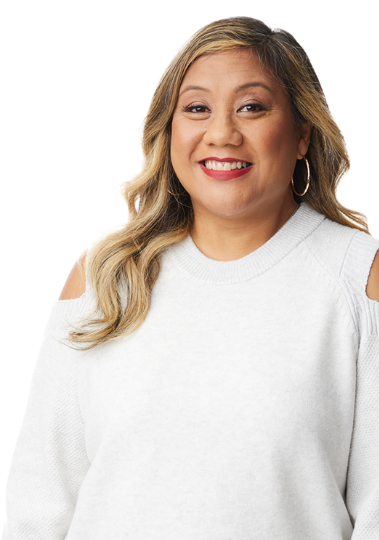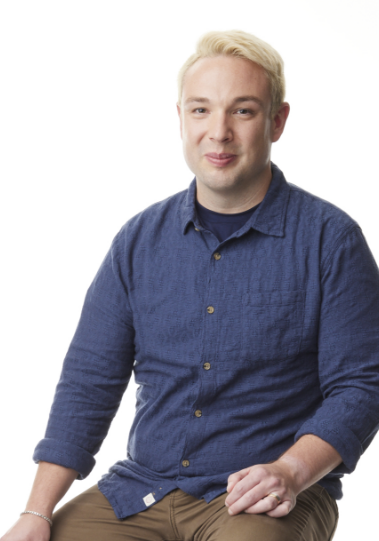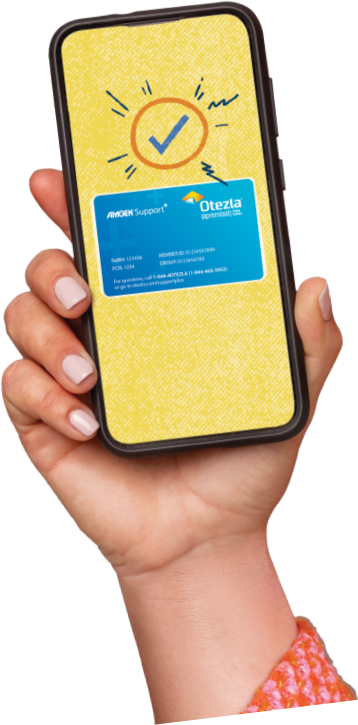Active Psoriatic Arthritis:
Active Psoriatic Arthritis:
Plaque Psoriasis:
Oral Ulcers Associated with Behçet’s Disease:
When Cindy’s psoriatic arthritis showed up, the things she loved most, like playing sports and keeping up with her twin sons, became difficult. She fought back the only way she knew how—research. She learned about Otezla, a pill that was different from the other treatments she had tried. Cindy’s doctor agreed Otezla was a good fit, and she left her appointment with a Treatment Initiation Pack Sample that same day. She noticed less swelling, tenderness, and pain in her joints after just 4 months of treatment with Otezla.
Your experiences may vary.
*Patients have been compensated for their time.
Scroll for More





Pat had gotten used to covering up his plaque psoriasis and learned to live with the pitting in his nails and head-to-toe plaques. Over the years, he’d experienced lots of trial and error with different doctors and various topical treatments. But as time passed, Pat grew tired of sticky ointments on his skin. He decided it was time to try something different, and his doctor told him about a pill called Otezla. Pat is happy to say he started seeing clearer skin after 4 months and has now been on Otezla for 6 years.
Your experiences may vary.
*Patients have been compensated for their time.
Your experiences may vary

When Cindy’s psoriatic arthritis showed up, the things she loved most, like playing sports and keeping up with her twin sons, became difficult. She fought back the only way she knew how—research. She learned about Otezla, a pill that was different from the other treatments she had tried. Cindy’s doctor agreed Otezla was a good fit, and she left her appointment with a sample Starter Pack that same day. She noticed less swelling, tenderness, and pain in her joints after just 4 months of treatment with Otezla.
Your experiences may vary.
*Patients have been compensated for their time.
Your experiences may vary

At first, Michael treated his plaque psoriasis with topicals. He felt frustrated by the messiness and stickiness of the topicals and began to seek out a different treatment option. He and his doctor decided that Otezla would be a good fit for him. Michael is excited to share that after 4 months of treatment, with the help of Otezla, his symptoms have been reduced.
Your experiences may vary.
*Patients have been compensated for their time.
Your experiences may vary.

Kayla used topicals to help treat her plaque psoriasis symptoms of dryness, itching, and cracking skin. She didn’t like how the greasy, sticky creams and lotions made her feel. After talking to her doctor, they recommended she try Otezla. A pill is a great fit for Kayla, and she is thankful she has Otezla.
Your experiences may vary.
*Patients have been compensated for their time.
Your experiences may vary.

For Genine, treating itchy, flaky scalp psoriasis used to mean applying greasy oils and creams each night which took away from spending time with family. When plaque psoriasis showed up on her fingernails, she and her doctor had a conversation about treating plaque psoriasis differently— from the inside-out, with a pill. With Otezla, Genine is happy to have seen clearer skin after just four months with a treatment routine that better fits her lifestyle, and helps her make time for the things she loves.
Your experiences may vary.
*Patients have been compensated for their time.
Your experiences may vary.

Rebecca was in college when she first saw plaque psoriasis appear on her face. From there, she was prescribed topical treatment after topical treatment, and their greasiness made it challenging to have a certain skincare routine or wear the clothes she wanted. Rebecca shared this with her doctor, who recommended a pill called Otezla. Rebecca is happy to have a plaque psoriasis treatment that works for her lifestyle and would encourage others to talk to their doctor sooner.
Your experiences may vary.
*Patients have been compensated for their time.
Your experiences may vary.

Jillian’s most frustrating plaque psoriasis symptom was itching. She found herself digging her nails into her skin just to avoid scratching off the plaques. She was trying to manage her symptoms but felt like she was using topicals all the time. She knew there had to be a different treatment option, so she discussed it with her doctor, and they decided Otezla would be a better fit for her lifestyle. Jillian has had a positive experience on treatment with Otezla, and most days, she says she doesn’t have to cover up her skin.
Your experiences may vary.
*Patients have been compensated for their time.
Your results may vary.

Dallas Goedert, Pro Football Champion and Otezla Patient, shows two Fox Sports Radio hosts, Covino and Rich, what it’s like to be a pro football player with plaque psoriasis. Covino and Rich compete to see if they can beat Dallas’ football stats while putting up with some distractions – just like Dallas can experience with his plaque psoriasis. His struggle with the condition is one of the many obstacles he’s had to face throughout his career. Now, Dallas treats his plaque psoriasis with Otezla – he has clearer skin after 4 months and thinks less about distracting itchy, flaky plaques.
Your results may vary.
Your results may vary

Professional football champion Dallas reflects on his plaque psoriasis journey one year after starting treatment with Otezla. After years of being challenged with applying topicals in hard-to-treat areas, Dallas talked with his doctor about a different approach—treating plaque psoriasis from the inside out, not just on the surface, with a pill: Otezla. Now, after being on treatment for over 4 months, Dallas is seeing results. His skin is now clearer with less redness, itching, and flaking, and he’s on a treatment that fits into his routine both on and off the field.
Your experiences may vary.
*Patients have been compensated for their time.
Your experiences may vary.
Did you know you may be eligible to pay as little as $0* out-of-pocket per month with the Otezla Co-Pay Program if you have commercial insurance? Your co-pay can be applied to deductible, co-insurance, and co-payment, and is available regardless of your income level.
First-time co-pay card user? Find out more.
No insurance? Learn more about accessing your Otezla prescription.
*For commercially insured patients only. Eligibility criteria and program maximums apply.
See AmgenSupportPlus.com/copay-terms for full Terms and Conditions.


Do not take Otezla 30 mg tablets or Otezla XR 75 mg extended-release tablets if you are allergic to apremilast or to any of the ingredients in Otezla/Otezla XR
Otezla/Otezla XR can cause serious side effects, including:
Some medicines may make Otezla/Otezla XR less effective and should not be taken with Otezla/Otezla XR. Tell your doctor about all the medicines you take, including prescription and non-prescription medicines.
The most common side effects include diarrhea, nausea, upper respiratory tract infection, tension headache, and headache. These are not all the possible side effects with Otezla/Otezla XR. Ask your doctor about other potential side effects. Tell your doctor about any side effect that bothers you or does not go away.
Tell your doctor if you are pregnant, planning to become pregnant or planning to breastfeed.
You are encouraged to report negative side effects of prescription drugs to the FDA. Visit www.fda.gov/medwatch, or call 1-800-332-1088.
Please click here for the Full Prescribing Information for Otezla/Otezla XR.
Prescription Otezla® /Otezla XRTM (apremilast) is used for the treatment of:
Active Psoriatic Arthritis:
Plaque Psoriasis:
Oral Ulcers Associated with Behçet’s Disease:
Do not take Otezla 30 mg tablets or Otezla XR 75 mg extended-release tablets if you are allergic to apremilast or to any of the ingredients in Otezla/Otezla XR.
Otezla/Otezla XR can cause serious side effects, including: